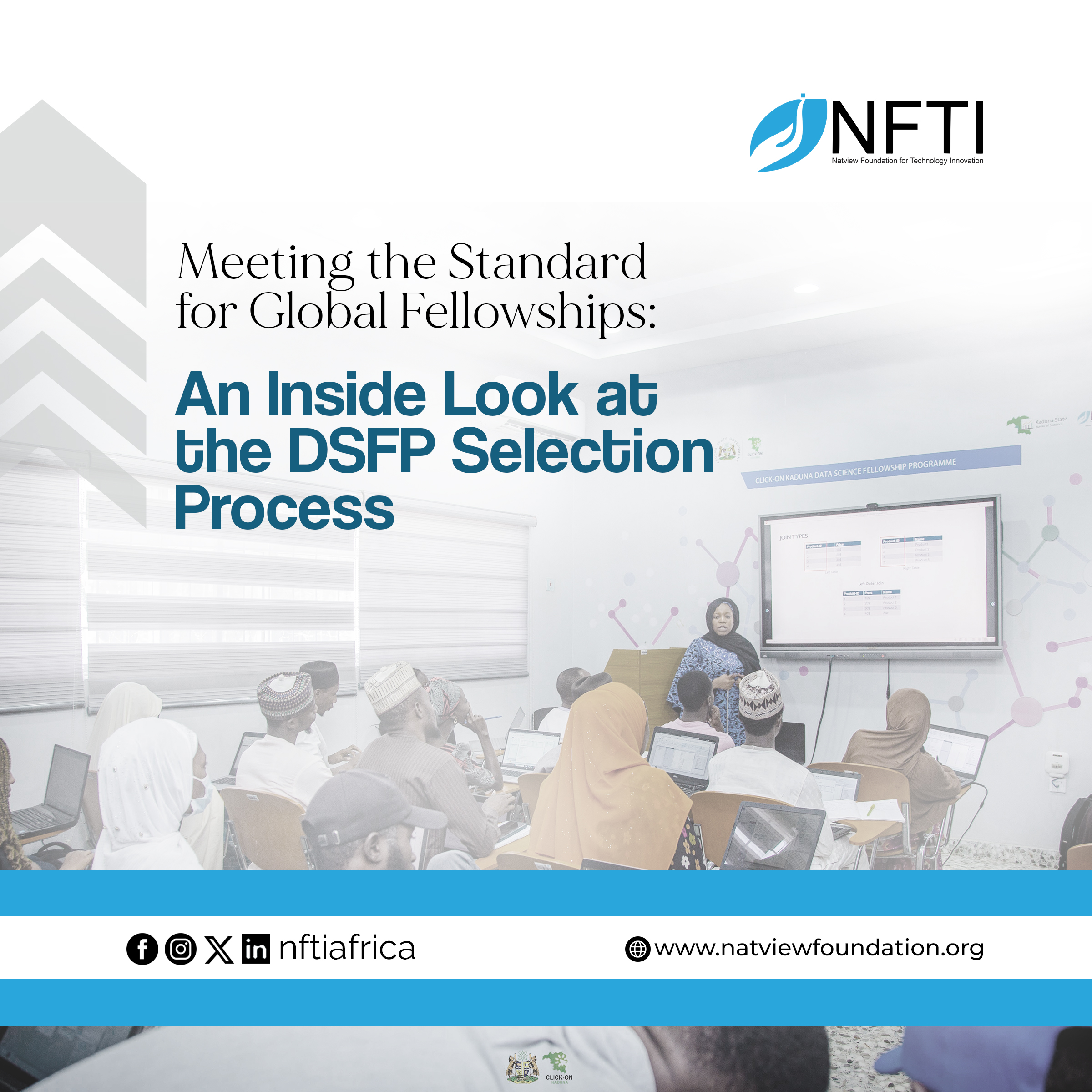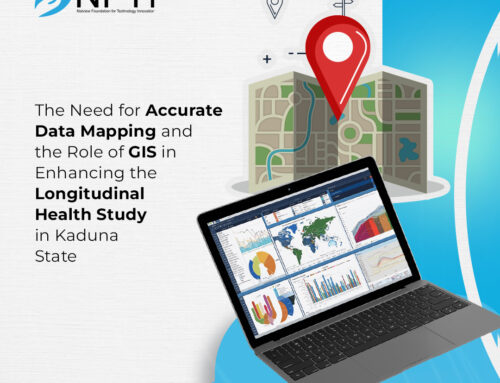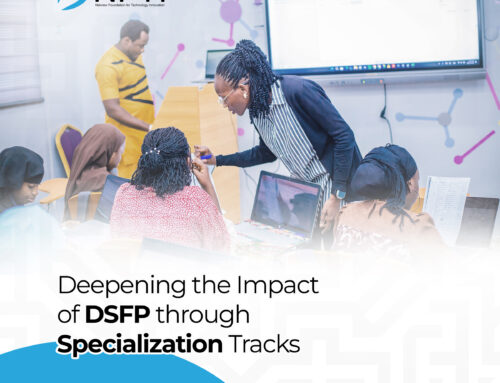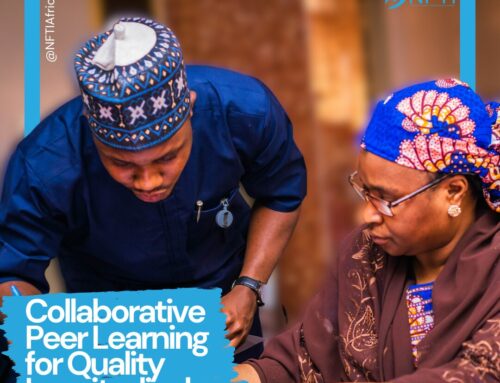From the moment the fourth Data Science Fellowship Program cohort (DSFP 4.0) was announced on social media in May 2024, candidates knew they were in for a thrilling adventure as 40 applicants will be selected from thousands of applications the program receives every year. After three months of navigating a rigorous four-stage application process, the anticipation reached its peak last week as candidates anxiously awaited the release of the final list of fellows. But the planning for this program didn’t begin in May, did it? The journey of creating DSFP 4.0 started long before, with meticulous planning and fantastic implementation that spanned months.
With each cohort, the DSFP team, led by NFTI, has consistently made the overall program better, striving to stay one step ahead of the curve. Here at the Foundation, we are driven by a powerful mission: to ignite a data revolution for sustainable development across Africa by providing the data and tools needed to inform policy, inspire innovation, and unlock communities’ potential. Hence, we’ve been strongly committed to empowering young people to shape a better tomorrow, driving social good, and achieving long-term change across the continent. Programs such as the Click-On Kaduna Data Science Fellowship Programme (DSFP), implemented in partnership with the Kaduna State Government, are critical components in achieving this mission. The Gates Foundation-funded fellowship is a deliberate and strategic effort to provide the next generation of African leaders with the skills and knowledge required to harness the power of data for positive societal impact.
As DSFP 4.0 prepares to welcome its newest cohort, it is critical to understand the rigorous and thoughtfully designed selection process that ensures only the most qualified and passionate individuals are chosen to participate. This article delves into the complex selection process of DSFP 4.0, examining how it aligns with our mission and compares favorably to top global fellowships. We’ll reflect on the foundation’s dedication to excellence and determination to empower young people to lead Africa into a future defined by data-driven decision-making.
The Data Science Fellowship Programme was established in 2018 to meet the growing demand for expert data analysts and cultivate an innovative culture capable of driving evidence-based policymaking in Kaduna State. In the last 4 years, the fellowship has provided 110 young people with the tools, training, and support they require to become leaders in data science. The DSFP has consistently demonstrated a remarkable track record of success, with over 60% of its graduate fellows transitioning to formal and virtual employment, pursuing further studies abroad, or establishing their own tech start-ups. While the program’s world-class training, expert instructors, and overall quality undoubtedly play significant roles in these outcomes, the meticulous and rigorous selection process is a crucial factor that makes the program prestigious.
The selection process is about finding individuals who embody the values of innovation, resilience, and social good. The process is designed to be on par with the most prestigious and competitive global fellowship programs. Its emphasis on inclusivity, transparency, and excellence ensures that the most qualified and passionate individuals are selected to participate, while also providing opportunities for candidates from diverse backgrounds and experiences. The DSFP’s holistic approach to candidate selection, which considers both technical skills and personal attributes, sets it apart from many other fellowship programs. Each of the four stages of the selection process is designed to challenge candidates, test their knowledge and skills, and assess their potential to succeed in the demanding and dynamic environment that the Kaduna SDGs Data Lab provides. The selection process begins with a comprehensive application that requires candidates to demonstrate their passion for data science and skills, as well as their understanding of the role of data in driving social change. This initial stage is crucial as it sets the tone for the entire selection process. Candidates are required to submit detailed essays and video applications that outline their motivations for applying to the program.
Following the initial application stages, selected candidates are invited to take a computer-based test (CBT) that assesses their technical skills, critical thinking abilities, and problem-solving capacity. The CBT is an important component of the selection process because it allows the program to evaluate candidates’ readiness to tackle the complex challenges that the data science industry presents. Candidates who successfully pass the CBT are invited to participate in an interview with members of the DSFP selection committee. The interview stage allows the committee to engage with candidates on a personal level and assess their alignment with the program’s values and goals.
The selection process is designed to be transparent and objective, with clear criteria and guidelines provided to ensure that all candidates are evaluated fairly. The DSFP’s commitment to transparency is further reflected in its efforts to communicate the outcomes of the selection process to candidates promptly and respectfully. The fellowship places a significant emphasis on gender inclusiveness, ensuring that both men and women have equal opportunities to participate and excel in the program. This commitment to gender balance is evident at every stage of the selection process, from the initial application to the final interviews. We have carefully designed assessment criteria that are free from gender bias, actively encouraging applications from women to foster a diverse cohort and break down barriers in the tech industry. This model of inclusivity is worth emulating, as it enriches the learning environment with diverse perspectives, leading to more innovative and well-rounded outcomes. Besides the stringent recruitment requirements, the fellowship program is committed to building a robust community of alumni. A large number of alums are now leading the charge for data-driven decision-making and encouraging innovation in the public and corporate sectors, as well as international organizations. The DSFP’s impact extends well beyond the fellowship itself. Its alumni are now part of a growing network of African data scientists who are driving the data revolution on a global scale. From the United Kingdom to the Netherlands, Rwanda to the United States, and within the core of public service in the Kaduna state government, past fellows are excelling in their respective fields, making significant contributions wherever they go.
The selection process is and will be essential to the DSFP’s success as it develops and expands. To maintain its position as Africa’s leading data science fellowship program, the implementation partners will stay flexible enough to respond to the evolving demands of both the industry and the community.





